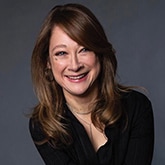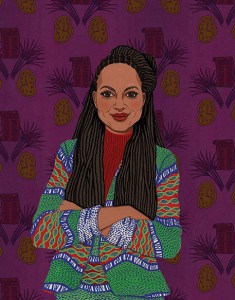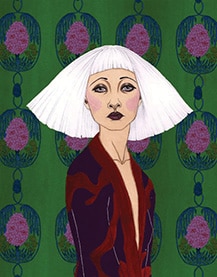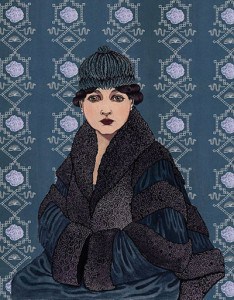Elizabeth Weitzman
Author Elizabeth Weitzman to lead gallery tour
Thursday, February 6, noon, free
Elizabeth Weitzman, author of Renegade Women in Film & TV, will visit the Simon Family JCC for a community luncheon and gallery tour as part of the Lee and Bernard Jaffe Family Jewish Book Festival, through the Jewish Book Council. Her book, Renegade Women in Film & TV blends stunning illustrations, fascinating biographical profiles, and exclusive interviews with icons such as Barbra Streisand, Rita Moreno, and Sigourney Weaver to celebrate the accomplishments of 50 extraordinary women throughout the history of entertainment.
As part of Weitzman’s visit, a selection of illustrations from her book are on exhibit in the Simon Family JCC’s Leon Family Gallery, leading up to the 27th annual Virginia Festival of Jewish Film.
The luncheon and gallery tour with Elizabeth Weitzman are free with RSVP required. Renegade Women in Film & TV is for sale at the JCC front desk. For more information, or to make reservations, go to JewishVA.org/bookfest or call 965-6137.
About the Exhibit
There have been so many game-changing women in film and television that it would take volumes to cover them all. In fact, women have been involved in every aspect of moviemaking since the 19th century, when director Alice Guy-Blaché helped invent the art form itself.*
As it happens, the early years of cinema were among the most open to women. Silent film director Lois Weber was as celebrated in her day as Ava DuVernay and Patty Jenkins are today. Screenwriters Frances Marion and June Mathis were the top earners in all of Hollywood. And, one of the highest-paid actors was the revered Alla Nazimova, a bisexual feminist immigrant.
But, who knew? The answer, of course, is that too few people have even heard of these pioneers. As movies hardened into a big-money industry, women found themselves increasingly pushed aside. Their courageous struggles against systemic inequality and prejudice often went unnoticed—or worse, were flatly discounted. Eventually their names faded from memory, as did their accomplishments.
But culture shifts, and Hollywood has been experiencing a seismic evolution over the last few years with women claiming their space. The Time’s Up and #MeToo movements have brought horror stories out of the shadows, and have also revealed tremendously impactful examples of bravery and strength.
At the same time, box office smashes like Wonder Woman, Black Panther, and Crazy Rich Asians are evidence that audiences are done waiting for diversity and representation in entertainment. So are the actors, writers, and directors.
And, then, there’s television.
It turns out that women in entertainment do the same thing women everywhere have always done: create new opportunities out of imposed limitations. In 1953, Ida Lupino was the only high-profile woman directing in Hollywood. By 1956, she’d turned to TV. In the decades since Lupino and movie starlet Lucille Ball forged this path, it’s gotten a lot wider.
More women working means more women working. More women supporting one another, so that more women’s stories are told. And nowhere has this been more evident than on TV.
The immovable object that is Hollywood faces the unstoppable force of filmmakers like DuVernay and Jenkins—or showrunners like Mara Brock Akil and Shonda Rhimes—and others follow. A few people are brave enough to speak out about sexual harassment, and others follow. An award winner uses an acceptance speech to demand equality, and others follow.
Many of the trailblazers didn’t have the benefit of movements. They kicked open doors while carrying heavy burdens, and paid an oppressive price. The stories in the first half of the exhibit (book) are often bittersweet at best; you’ll wish the renegades who worked so hard could have seen the changes they wrought.
The insights that several were generous enough to share are fascinating. All of these extraordinary icons are as hopeful about the future as they are honest about the past.
*Guy-Blaché was French, but there are so many incredible women throughout the history of global cinema that this book has focused on those, like her, who’ve worked primarily in the U.S.




